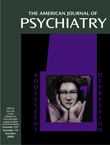Randomized, Placebo-Controlled, Double-Blind Clinical Trial of Sertraline in the Treatment of Depression Complicating Alzheimer’s Disease: Initial Results From the Depression in Alzheimer’s Disease Study
Abstract
OBJECTIVE: This study evaluated the efficacy and safety of sertraline in the treatment of major depression in 22 outpatients with Alzheimer’s disease. METHOD: Twelve of the 22 patients were given sertraline and 10 were given placebo by random group assignment for 12 weeks. Response to treatment was measured by using the Cornell Scale for Depression in Dementia. The patients were also assessed with the Hamilton Depression Rating Scale, the activities of daily living subscale of the Psychogeriatric Dependency Rating Scales, and the Mini-Mental State. RESULTS: After 12 weeks of double-blind, placebo-controlled treatment, nine of the patients given sertraline and two of those given placebo were at least partial responders. Patients given sertraline had significantly greater mean declines from baseline in Cornell Scale for Depression in Dementia scores; the bulk of antidepressant response occurred by the third week of treatment. CONCLUSIONS: Sertraline is superior to placebo in reducing depression in patients with Alzheimer’s disease who also suffer from major depression.



